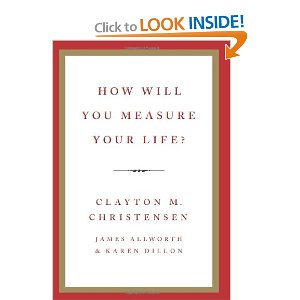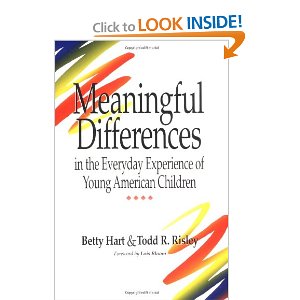Do you know how to “grow your child’s brain”?
Do you know the best “window of opportunity for building the connections in your child’s brain that help them to succeed in school”?
Do you know how EASY it is to do?
I’ve been reading a Business Book called How Will You Measure Your Life?
There is a chapter titled, The Ticking Clock.
It’s about the danger of delaying investment in your family, in order to build your career, only to discover you missed the opportunity.
Today, while reading that chapter, I came across some truly amazing research that describes the “effects of how parents talk to a child during the first two and a half years of life”.
All parents talk to their infants and young children. It’s easy. It’s natural.
Some parents talk a little and some talk a lot. And the content varies widely too.
How much difference can such an easy, natural part of parenting make to a child’s brain development and future success in school?
It turns out that it can make a huge difference.
I wish millions of potential parents could see the results of this research.
I wish I had seen it before I raised my children.
The research was conducted by Todd Risley and Betty Hart. Their book Meaningful Differences is available from Amazon.com
They followed 42 families in the Kansas City area gathering data on how many words per hour they spoke to their children.
Try this: time yourself and speak 35 words (just read from a magazine or book). How long did it take?
I read aloud, with emphasis, from David Allen’s book, Getting Things Done, and spoke more than 100 words in 1 minute.
They found that parents who talked to their children as they would talk to adults, with a full vocabulary and normal sentence structure, using 2100 words per hour, had children with significantly higher performance on vocabulary and reading comprehension as they got older.
These tests are the early predictors of school success.
Don’t freak out—if you spoke 100 words a minute for just 1/3 of an hour you’d hit the 2100 w/hr mark. That gives you 39 minutes to spare every hour.
Here’s the surprising part: it didn’t matter what socio-economic group the families were in. Some highly educated and economically successful parents only spoke 600 words per hour and some welfare families spoke 2100 per hour. The key factor was that kids hear rich conversational language spoken to them especially in their first year of life.
I started this post with a question.
Do you know how to grow your child’s brain?
The conclusion Dr. Risley and Dr.Hart make is that the complex language (not baby talk) and lots of it are having an effect on the child’s brain synapses. It’s like exercise for their brains keeping them limber and gaining connectivity—which is like brain muscle.
I’m passing this along because the results of the study are amazing.
Even if their brains aren’t changed, their hearts will be filled with the love you are sharing as you include them in your thoughts and conversation throughout the day.
It couldn’t possibly hurt and it just might make a genuine difference for the good.
Here is a link to a 5 minute segment on NPR about the original research and the new interest it has recently generated.
http://www.npr.org/2011/01/10/132740565/closing-the-achievement-gap-with-baby-talk
I hope you’ll watch it. I hope you’ll share it.
I hope you’ll talk to babies and children every chance you get!


+ show Comments
- Hide Comments
add a comment